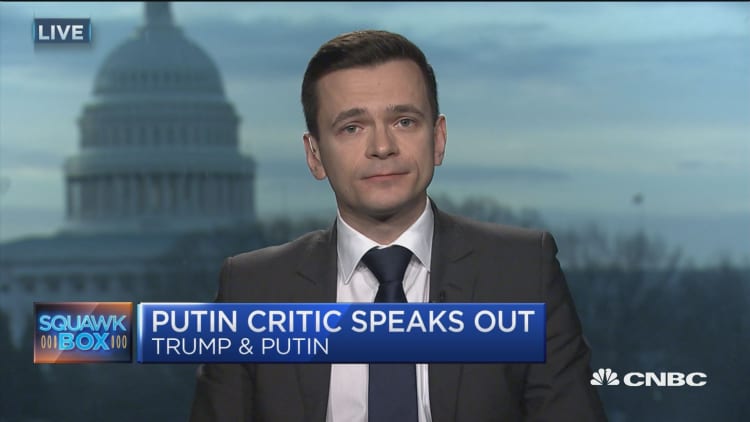The inauguration isn't just a big day for Donald Trump. Vladimir Putin probably thinks it's a big day, too.
With an outgoing administration saying that Putin wants to upend the Western world, and an incoming president saying the Russian strongman could make a good American partner, more people than ever want to understand: What makes Putin tick? What, exactly, does he want?
"Victory for Vladimir Putin is dying in his sleep while still in power. I mean that quite sincerely," said Bruce Bueno de Mesquita, professor of political science at New York University and author of "The Dictator's Handbook." "Leaders want to stay in power. He is very good at staying in power."
Putin has immediate political goals, Bueno de Mesquita said, "but those are secondary, and it's important to understand that those are secondary."
Putin will do all in his power to try to reassemble, in some way, Russia's influence over the countries of central Europe that were formerly Soviet statesSkip Valleeformer U.S. ambassador to Slovakia
Putin, Bueno de Mesquita said, boosts and protects his personal power first and foremost by rewarding the people who support him and who are also his closest threats: other Russians in the military, government bureaucracy and industry.
And among industries in Russia, the most important by a long shot is the largely nationalized energy sector. The country is what political scientists call a "petrostate," meaning that it depends on oil and gas exports in order to remain solvent.
Russia's economy was crushed in 2014 by a plunge in oil prices and sanctions slapped on the country by the Obama administration and America's Western European allies after Russia took over part of Ukraine. Putin watched his country's gross domestic product crater by a staggering 40 percent between 2013 to 2015, and it has edged even lower since. Russia's GDP is less than Italy's or Canada's, though those countries have only a fraction of Russia's population.
Stephen Sestanovich, a senior fellow at the Council on Foreign Relations and former U.S. ambassador-at-large for the former Soviet Union, said Putin's "immediate goal seems to be some sort of get-out-jail-free card — an end to all the steps that Europe and the U.S. took to counter his aggression in Ukraine."

Putin has limited say about the global price of oil. But Trump's entry into the White House could be Putin's moment to revitalize his country's economy through new partnerships with U.S. companies and new demand from European businesses, which have not been able to sell their goods to Russia due to the current sanctions — if the sanctions go away.
That's especially important now, because the big economies of Europe have taken steps to cut their dependence on Russian energy.
"Russia, of course, would like to have as big an oil and gas market for itself as possible. But this is something that Russia has lost in part. The dependence of European countries on Russian gas has decreased — and Europe has worked on that," said Maria Lipman, a visiting lecturer at Indiana University's Russian and East European Institute and the editor-in-chief of the Russian journal Counter-point.
It's critical to Putin that he maintain as much influence as possible over his closest export markets. Russia's immediate neighbors are mostly militarily and economically weaker than Russia, and so more susceptible to Putin's whims than a Germany or a France is.
"Putin will do all in his power to try to reassemble, in some way, Russia's influence over the countries of Central Europe that were formerly Soviet states," said Skip Vallee, former U.S. ambassador to Slovakia from 2005-2007.
While everybody is saying they are surviving with sanctions, let me tell you every morning Putin is praying for sanctions to be lifted, and every evening he is praying for sanctions to be lifted.Bill Browderhead of Hermitage Capital
Several foreign policy experts who spoke to CNBC said that one way Putin will attempt to expand and in some cases regain control in Central and Eastern Europe is by working closely with President Trump, who has repeatedly expressed interest in working with the Russian leader.
"Putin is hoping to meet with Trump sooner rather than later," said Angela Stent, Georgetown University's director of the Center for Eurasian, Russian and East European Studies and a former intelligence officer at the U.S. National Intelligence Council.
Stent said the Russian president feels that his country is overlooked by the United States. Former President Barack Obama, who had a famously bad relationship with Putin, a month ago characterized Russia as a potentially dangerous but deeply flawed nation: "They are a weaker country. Their economy doesn't produce anything that anybody wants to buy, except oil and gas and arms. They don't innovate."
Words like that sting not just Putin but also regular Russians, many of whom remember their country being a superpower not long ago. (At a time when Putin, incidentally, was a KGB agent.)
"Putin wants Russia to be taken seriously, and to ensure his views are taken into account," said Stent.
What seemed impossible a year ago, may not be too far-fetched if Trump continues to encourage a stronger relationship — whether it be geopolitical or economic — with Russia.
A lot comes back to those sanctions.
"While everybody is saying they are surviving with sanctions, let me tell you every morning Putin is praying for sanctions to be lifted, and every evening he is praying for sanctions to be lifted," Bill Browder, head of Hermitage Capital and a longtime anti-Russia activist told CNBC at the World Economic Forum in Davos, Switerzerland, on Friday.
"It would be the biggest single gift that could ever be given to him if it was to happen with the new Trump administration," he said.



